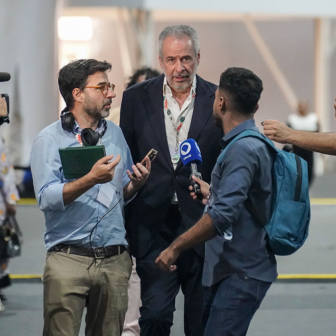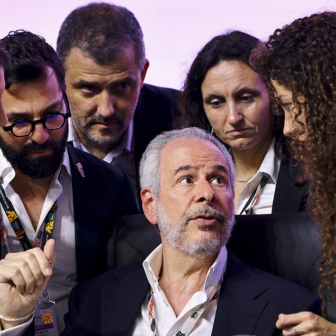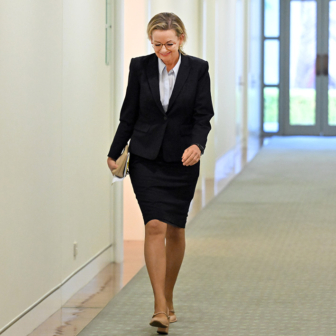The audiovisual trolley in my primary school was a thing of majesty. An industrial-grey metal tower housing stacks of heavy plastic VCRs and a convex-screened television, it would herald its entry to the classroom with gentle squeaks, rolling slowly with a train of yellow and grey cords in its wake. Its arrival was a rare but invariably exciting portent of good tidings: an hour or more sitting cross-legged on the sand-flecked carpet in cool semi-darkness rather than sitting at our fluorescent-lit desks. It was in such a constellation that I experienced my climate epiphany, one afternoon in the spring of 1989.
I don’t remember the name of the documentary we watched, or even the teacher who showed it to us, beyond his spectacular moustache and fondness for lessons on “bush survival skills.” But I will never forget the graph I saw on the screen that day: a lime-green line, superimposed across an image of the earth, charting the rise of global surface temperatures since 1960. The line went up and steadily up, fading into ominous red as it approached the 1980s. There was no violent up-tick at the end, like the “hockey-stick graph” that would feature in An Inconvenient Truth seventeen years later. Nor did the line end in the splayed fingers of alternative “shared socioeconomic pathways” like the graph in the Intergovernmental Panel on Climate Change report twenty-eight years later. It nevertheless made a deep impression on me.
It was clear, from that line, that we were all going to have to do something, very urgently, to get it to go back down again.
With an imagination fertilised by stories of Vietnam war protests, the Australian kids TV show Secret Valley (in which plucky BMX-riding teenagers in a koala-filled valley stood battle with greedy real estate developers week on week), and the slogan “think global and act local,” I did the thing that was obvious for a child to do in 1989. I started a group within the school with a grandiose name. We were known as “PEACE,” an acronym for People for the Environment and Conservation Everywhere, and we had an immediate, concrete objective: the elimination of the non-recyclable polystyrene cups used in the school canteen to serve out chicken soup at lunchtime.
Tales such as these tend to follow a familiar narrative arc, one that traces a political awakening through the experience of coming together to make demands, and builds to the realisation of the immense power we realised we had to speak truth to power more generally. First the polystyrene cups, and then the world.
But that is not what happened. Instead, the school principal asked gently how else we proposed to keep the drinks hot and safe, we said we didn’t know, and “PEACE” dissolved soon after, our short- and long-term aims unmet. My nascent environmental consciousness was channelled elsewhere, into checking hairspray cans for CFCs and applying sunscreen and wearing broad-brimmed hats with renewed authority and vigour.
But this is not a simple tale of dissipated personal resolve. I did not lose interest in the global temperature line. Rather, I did what I was socialised to do. I “grew up.”
In 1990s Australia, this meant devoting attention to a different sort of line, one that was not written down or public, but rather in my own head: my private line of personal progress. I had been raised in the slipstream of the postwar “golden age” as an indirect beneficiary of a set of educational, industrial relations and social security policies that had enabled my father, who had grown up in a poor family and left school without matriculating in the 1940s, to move into the middle class in the 1960s after many years spent working as a cleaner.
Significant changes were under way in the Australian economy in the 1990s, but what was in my teenage head was a melange of beliefs from an earlier time: an awkward and undigested blend of Fordism, the Protestant work ethic, Keynesianism and second-wave feminism. These collectively distilled into the commonsense idea that hard work, delayed gratification and education were reliable fuel for an upward trajectory in life. It was a belief that, upon obtaining the requisite good marks at school, and then uni or TAFE, you had a ticket to do work that was interesting and useful, entailed more complexity and responsibility as you got older, and earned enough to enable you to buy a house, have a family, and retire comfortably. It was a deal I assumed applied to everyone; not a special offering for those with superabundant talent, energy or privilege.
Unlike the global temperature line, the determinants of this personal-progress line felt wholly within my control. They nestled comfortably in the fabric of everyday life, an unspoken and unacknowledged dimension of day-to-day chats with friends about things like which subjects to choose, which jobs to apply for, and where to live. Yet, as the 1990s flipped into the millennium, it became gradually clear that the pursuit of work that was socially useful, interesting and reasonably paid was not so much a singular endeavour as a competitive and strategic puzzle. You couldn’t have all three, or rather, for women, four, since the question of how to fit in children was an additional matter that we alone had to consider.
Those fortunate enough to be buoyed with parental wealth seemed to have an easier run, not only at achieving two, three or more of the prized quartet, but in taking risks to get them, backed by a sense of entitlement and the knowledge that their family would bail them out if needed. For those with less cultural and material capital, the horizons were shorter. And the rules that seemed so self-evident at high school had the habit of melting and morphing without explanation every time we tried to play within them.
As I was navigating these questions, that other line, the global temperature one, did not disappear from my consciousness. But, if I am honest, it occupied a different universe from that personal-progress line. I had the climate in mind when trying to decide whether to ride my bike rather than drive, when remembering to take my reusable bag rather than use a plastic one, when buying a KeepCup. The climate line related to stuff and its management. Superego, rather than ego. Things I was supposed to say no to rather than the grand, existential puzzle of what to say yes to.
Conversations about the climbing red line and what it meant were awkward to have with friends. They didn’t seem to last for very long.
The different ways we talk about work and its future don’t mesh well with the reality that we have just twelve short years to avert calamitous climate change.
The “just transitions” narrative, for instance, takes a narrow view. It quite rightly observes that there is no zero-sum choice between jobs and the environment. Twenty-four million jobs worldwide will be created by 2030 by virtue of renewable industries, comfortably eclipsing the six million jobs predicted to be lost from the cessation of fossil fuels. It is crucial that workers in the latter group are offered fair support to transition into these new industries or into other work, of course, but so far this story has little to say about workers who are not closely proximate to the work involved in energy extraction and production.
The “digital disruption” story of the future of work, by contrast, is expansive in its scope. It foretells unimaginably vast changes in present configurations of work, heralding the inevitable breaking down of jobs into tasks, many of them vulnerable to replacement by machines. A tone of gleeful inevitability commonly accompanies this narrative, paired with an insistence that technological change has invariably led to a “net jobs gain” in the past, and will do so again. As long as workers adopt a suitably “flexible” mindset, and no one holds back on investment in technology, all will be well.
A more pessimistic narrative of work may be found among the heralds of the “precariat.” For the first time in history, they argue, we have a generation who, despite high levels of educational attainment, are forced to work in “careerless jobs,” with no “shadow of the future” in their working lives, to use Guy Standing’s chilling phrase. Detached from any sense that what they say or do today will make any difference to their fate tomorrow, they are the new dangerous class: frustrated, insecure, indebted and stressed, ripe for seduction by the politics of xenophobia, populism and nostalgia.
And finally, there is an even grimmer story, in which panic gives way to elegy and lamentation. Commonly associated with the writer Paul Kingsnorth and the “Dark Mountain” project, this narrative suggests that human industrial systems are effectively unstoppable, fuelled by a set of toxic myths about the separation of humanity from “nature” and the necessity of human “progress.” All that can be done from here is to challenge these myths with counter-stories and privately pursue lives outside industrial systems.
These four narratives share a few common logics. All (apart from just transitions) tend towards determinism, and the sense that we humans have little agency in the question of how work is organised and valued, and that it is instead some other force, be it technology, neoliberalism or industrial capitalism, that sets the terms of our future. What each shares, too, is the implicit dismissal of work as a viable stage upon which we might collectively struggle for a better system. Indeed, these narratives carry little optimism that any alternative social order will ever be possible at all.
It is a diagnosis that is premature. Signs of an appetite for alternative orders to the “take/make/consume/dispose” model of human progress abound. From the streets full of schoolchildren on strike for the climate to the Green New Deal movement to the language of “circular economies” starting to be heard in business and government, new modes of thinking about what human progress means are emerging and beginning to erupt into mainstream politics all over the world.
And just as it is premature to give up on the possibility of a new social order, so too is it hasty to abandon the idea that work can be a political site from which to fight for the reform. For there is a crucial link between “sustainability” and work that is perhaps very obvious but rarely made explicit: the process of “sustaining” requires human labour. It means more than simply saying “no” to damaging acts of consumption; it also means saying “yes” to the human activities that are positively necessary for the repair, renewal and regeneration of our soils, our oceans, our cities, our critical human systems and our human bodies.
A society that exists within planetary limits is one that looks on such work as more than just an afterthought or “non-core” aspect to the “real” business of production. It rather treats it as utterly elemental.
So how do we currently value and organise this work?
In Perth there is a carer working in a residential care home who thinks that no one should ever die alone. There is no funding for palliative care supplies at her work, so she runs a raffle to enable her to buy what she needs, like moisturiser to use on the lips of people in the last days of life, when they can’t make their mouths wet any more. Most days she works more than an hour without pay. She has never been paid more than the award rate for forty-three years, despite the additional qualifications she has acquired with her own time and money. The time she gets to shower and toilet each person she cares for is approximately six minutes.
In Arnhem Land there is a Kuninjku man on an outstation who used to burn his country according to customary practice. His burning eased the destructive pressure on native species exerted by feral cats, cane toads, pigs, cattle and other animals, and formed part of a sustainable hybrid economy that comprised hunting and fishing, arts and crafts, and access to state transfer payments. Since 2015, government policy changes mean that he must now engage in “work-like activity” (which does not include caring for country) for twenty-five hours a week, on an hourly rate of $11.60, without standard industrial protections. He has no time for burning now, and the Kuninjku hybrid economy has all but disappeared.
In Brisbane there is a woman who loves to care for and teach young children. Her wage is so low that she cannot afford to have children of her own.
In Hobart there was a security guard who worked in the state’s court complex whose name was known by every employee and regular user of the building. She had a low, quiet voice capable of soothing the most intimidating of offenders. She offered support to domestic violence victims and solace to the parents of young offenders. One day, after twenty-one years of work, her position was converted into a casual one by the service multinational who had taken over the contract. She could not pay her mortgage on such uncertain wages, and was forced to leave.
In Perth there was an engineering graduate who wanted to work in renewable energy manufacturing. Despite top marks, he was unable to get a secure job in that field. Others in his cohort found jobs in oil, coal and gas industries, earning, on average, $180,000 a year.
In rural New South Wales there is a regenerative farmer who knows how to “read” the landscape, measuring success in terms of the levels of animal health, species diversity and the quality of nutrient and water cycling on his property. Seeing his farm in this way meant that he had to painstakingly “unlearn” everything he was taught about best-practice farming over decades.
In Adelaide there is a junior humanities academic who gave birth to a human being. Devoted to her discipline and the maintenance of an intergenerational conversation about the world through teaching and writing, she worked for years as a casual, always taking more than her allocated forty-five minutes per student per term to be the best teacher she could. Research was done in her own time in the hope of securing a permanent job, but with a child to care for, she could no longer afford to work for free, and has left the sector.
Each of these people does work that is the opposite of what anthropologist David Graeber has called “bullshit jobs.” They bestow, daily, the thing that Simone Weil described as “the rarest and purest form of generosity,” namely, attention.
Their work is environmental. Not in the narrow sense of being low-carbon-emitting (although it is that). Nor in the sense that it boosts biodiversity (although some do that too). Their work is environmental because it is centrally concerned with human and non-human regeneration, and in particular with fostering social cohesion, trust, civility and a sense of order. It is environmental because it fosters education and the passing on of learning about how to live wisely and within limits. No society can simultaneously exist within environmental limits and be a democracy that does not possess an abundance of these things.
There are some common themes in their conditions of work. Their jobs generally lack pathways in and pathways up. Most of these workers are not “held” within a secure career structure that enables them to reliably progress over time in seniority, nor are they paid adequately to comfortably afford those social markers of “life progress”: a house and a family and a secure retirement. They are, rather, expected to “trade off” the meaningfulness of their work for material security, status and self-development.
For many, daily work is often frustrated and interrupted by management processes that are ill-suited to their labour. They must contend with rigid Taylorist grids, competitive frameworks, productivity metrics: repertoires of control and efficiency derived from industrial contexts thrust into vocations that have, for millennia, followed the tempos and cyclical rhythms of human and environmental need rather than the dictates of the clock.
Many, if not most, of these workers live under the shadow of a glaring mismatch between the status of their work (in terms of pay and security) and the social value it creates. For we reward and support the stewards of renewal far less generously than we do the stewards of extraction and consumption, who benefit from myriad material and social supports that mean that their personal-progress lines don’t just start high, but are set up to rise.
No element of this work order is necessary, or inevitable. The point is not that these workers are victims. Far from it, most of those mentioned are actively organising and agitating in their workplaces and unions to make their conditions of work better. The point is rather that there is a deep perversity in our current order of work, which does not furnish the people who are doing the things most crucial to a flourishing planet and society with the means to flourish themselves.
As Australians, our obligations in responding to environmental crisis are particularly acute. We are one of the wealthiest and most technologically capable nations on the planet, and among the most blessed in renewable energy sources. Yet we are also one of the highest per capita emitters in the world. To put our current priorities in clear focus, the International Monetary Fund has calculated that Australia spends 1.96 per cent of its GDP on fossil fuel subsidies. That is almost four times the approximately 0.5 per cent of GDP we spend on early childhood education and care. In other words, for every public dollar we spend building a future for our youngest citizens, we spend nearly four dismantling that future.
There are powerful historical and geographical dynamics that have led to those damning numbers. Our “settler capitalist” trajectory was premised on extractive pastoral and mining practices. At the same time as that trajectory brutally destroyed and displaced Indigenous lifeways, it imported a highly gendered conception of public and private life that consigned work of social reproduction to women and systematically excluded it from the formal economic sphere.
But just as Australia’s history can be blamed for our present inertia, so too does it contain remarkable sources of inspiration for how we might meet the challenges we face now. We can learn from the religious, cultural and kinship structures that enabled Indigenous peoples to live on and tend to the land, sustainably, for millennia, and to pass on knowledge of how to care for country through the generations.
We can recall the philosophy that underpinned the creation of some of our key national institutions at Federation. The conciliation and arbitration system, for instance, was predicated on a set of principled arguments for determining where competitive markets belong and where they do not. It rested on a notion that our economic systems should be in service to a higher purpose — the development of people as full moral and social beings — and established systems for regulating industrial relationships to that end.
We can learn, too, from the fact that we have remade the fundamental determinants of our work order once already. One hundred years ago, the basic determinants of working life — the things that had the greatest bearing on your occupation, salary, permission to work at all — were gender and race. Imperfect and incomplete as the process was, we largely dismantled that system of formal discrimination in the final third of the twentieth century.
Finally, a sense of history can aid us in understanding why so many ostensibly powerful people seem to feel so powerless to do anything about our current crisis. Our embrace of a passive conception of government, one that confines itself, as Mariana Mazzucato has recently observed, to doing little more than merely “levelling the playing field” of the market and getting out of the way, has led us to consign great swathes of the work of renewal to the for-profit market. As a consequence, much of the care of our eldest and youngest citizens is the responsibility of firms necessarily operating within a financialised system that demands short-termism, risk-shifting, debt loading and lean labour costs. Such arrangements are not only unjust. They are the product of an anachronist and misplaced application of ideas that were gestated in the context of the cold war, in response to a centralising, statist, planning-obsessed Soviet enemy that no longer exists. They are institutional arrangements that come from another age and are not the ones we need to deal with these warming, fragmented and increasingly unequal times.
Such times demand a new work order, an updated social contract for our warming world that recognises anew that the purpose of our economy, and thus of work, is to facilitate the flourishing of our living systems. It is not to furnish markets, capital, GDP — or any of the human inventions we have devised as synecdoches for advancement — with raw material.
The essence of such a renewed social contract should lie in the notion that if you are doing useful work — and especially if you are doing the essential work of stewardship and renewal of our life-giving systems — you should be rewarded with the status, salary and self-development opportunities to enable you to fully develop your capabilities over your life course. You will not be left to knit together the elements of a full and flourishing career on your own.
The new work order can’t be technocratic. It needs to be built upon the strengthened efforts of those already engaged in renewal and stewardship work, and the community organisations, unions and environmental groups that support them.
There will be struggle. There are, after all, more than a few powerful stewards of the old take/make/consume/dispose order who will see no reason to simply surrender their status. We must start to see certain habits, practices and fields of expertise associated with short-termist, non-reciprocal corporate “extractivism” as being akin to occupational “stranded assets.” Just as certain bodies of fossil fuel ores must simply be kept in the ground, so too, these ideas for how to run a society must simply stay in people’s heads.
Technology must be seen as a servant rather than a master. It is crucial to contest the idea that technology, rather than people, determines the value and organisation of work. And, in particular, that it is “gigs” and “tasks” that comprise the natural units of work, rather than relationships, careers and domains of knowledge and practice. At the same time, it is crucial to avoid nostalgia. Digital capabilities and networked orders must be at the heart of our repertoire in thinking about how to reorganise and value work that is oriented to environmental repair and stewardship.
We must re-examine, too, our assumptions about what counts as low- and high-skilled work in light of what we now know about the complex needs of human and environmental systems. Our assumptions are currently stuck in a circular logic that ties status to levels of pay and credentialism, and “bakes in” the undervaluation of caring and relational work. There is no reason why domains of work that are currently fragmented and insecure cannot be rebundled into occupations that are more autonomous, skilled, relational and rewarding.
A new work order will not displace existing environmental imperatives. We must rightly continue to insist on a rapid and deep transition to renewable energy, reduced pollution and consumption, and the eradication of fossil fuel interests from politics. But a new work order will augment them in crucial ways, enabling people to weave the great work of social transformation into their everyday lives.
My generation will be the last to have a climate epiphany. My daughters are growing up always knowing that their world is careering towards a destructive path. They know it in the same sort of way I grew up knowing about the first world war — and thinking (with indecent arrogance) that if, somehow, I had been there, I would never have been involved in something so silly and pointless.
My hope is that by the time they are adults they will see as grotesque the fact that we — knowing about climate change — once paid our brightest young people handsomely for coming up with ingenious ways of flinging people and objects around the planet as frictionlessly and profitably as possible. That we did that at the same time as practically impeding the work of those engaged in the renewal and repair of the world. I hope they will look on such arrangements with a sense of incredulity, of the kind I felt when reading about the militarist logic that saw 57,000 British casualties on the first day of the Somme but insisted that young men wake up and go over the top to be slaughtered again the next day.
Of course, like any parent, I hope their little lines of personal progress rise, and that they find occupations that are useful and interesting and that nourish and nurture the people and places around them. But as every parent knows, I can’t do that for them. What I can do, and what all of us can do, is fight for a system that doesn’t press impossible dilemmas on their slim shoulders.
It is within our power to reshape our present order of work in a way that does not insist that the next generation must choose between work that renews the world and work that is materially secure. We can, instead, fashion a system that offers them a stake in a deep and expansive environmental politics. One that isn’t just about what they do or don’t buy, but that yokes together their private lines of progress with that other great line that determines and marks our collective fate. Such a system would not only be easier and fairer to live in. It would also enable their ambitions, their loves and their impulses to care for the places and people around them to be woven into a common social project they will fight for when we are all gone: the nurturance of life, and the flourishing of our common home. •
This is an edited version of the inaugural Iain McCalman Lecture, delivered at the University of Sydney on 6 February. The lecture was established to celebrate the career of the distinguished historian Iain McCalman.




